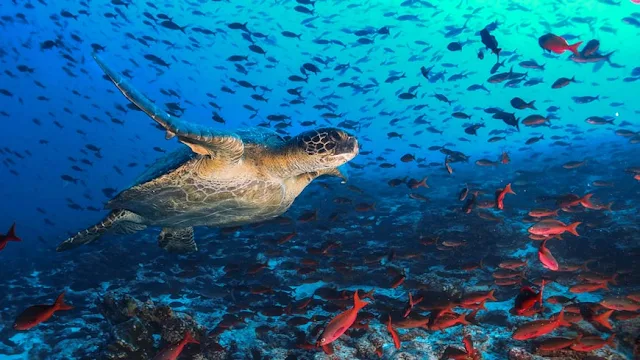There are fifteen concerns that scientists say we need to solve right away, including the mining of lithium from the deep sea, exploitation of species found in deeper waters, and the unforeseen effects of wildfires on land on the ocean.
In the next five to ten years, a group of worldwide specialists has identified 15 concerns that they predict will have a substantial influence on marine and coastal biodiversity.
They utilize a method called "horizon scanning" to look for topics that aren't getting much attention now but are expected to gain significance over the next ten years. Before these challenges have a significant impact on biodiversity, the goal is to increase awareness, stimulate investment in a thorough examination of these issues today, and maybe inspire policy change.
The problems include a "empty" zone near the equator as animals migrate away from this warming part of the ocean, the effects of new biodegradable materials on the marine environment, and the consequences of wildfires on coastal ecosystems.
According to Dr. James Herbert-Read, a professor in the Department of Zoology at the University of Cambridge and a co-first author of the study, "Marine and coastal ecosystems face a wide range of emerging issues that are poorly recognized or understood, each having the potential to impact biodiversity."
In order to safeguard our marine and coastal habitats, he continued, "we are pointing to where improvements must be taken today — both in monitoring and policy."
Thirty marine and coastal system professionals from 11 northern and southern hemisphere nations participated in the horizon scan. Their backgrounds ranged from scientists to decision-makers. The findings were released in the journal Nature Ecology and Evolution today.
The exploitation of ocean resources is connected to a number of the problems. For instance, "brine pools" in the deep sea are unusual marine habitats that are home to a variety of species and have high lithium salt concentrations. The authors issue a warning that the environment may be at risk due to the increased demand for lithium for batteries used in electric vehicles. They need regulations to guarantee biodiversity is evaluated prior to deep sea brine pool exploitation.
Although overfishing is an urgent issue, the horizon scan looked forward to potential future events. The authors speculate that fishing may soon shift to the deeper mesopelagic zone (200 m to 1,000 m), where fish that are unfit for human consumption might be sold to feed fish farms.
When it comes to overfishing in the mesopelagic zone of the ocean, for example, quick improvements, according to the paper's co-first author Dr. Ann Thornton of the Department of Zoology at the University of Cambridge, might avoid major issues from developing over the following ten years.
"Cutting this would not only decrease overfishing of these fish stocks, but it would also lessen the disturbance of ocean carbon cycling since these species are an ocean pump that pulls carbon from our atmosphere," she continued.
The paper also discusses how new biodegradable materials can affect the ocean. Some of these substances are more harmful to aquatic life than conventional plastics.
Governments are pushing for the adoption of biodegradable materials, but we are unsure of the potential effects these materials may have on marine life, according to Herbert-Read.
The authors also express concern about the impact of climate change on fish nutrition. Since cold-water fish species often synthesize essential fatty acids, when ocean temperatures rise due to climate change, less of these nutrient-rich molecules are created. Both marine life and human health may be impacted by such changes.
Not all of the anticipated effects are detrimental. According to the authors, the advancement of new technologies will help scientists better understand marine species and their distribution. Examples of these technologies include soft robots and improved underwater tracking devices. The creation of more effective marine protected zones will then be guided by this. But they also stress that before these technologies are widely used, their effects on biodiversity must be studied.
In order to solve the difficulties facing marine ecosystems, scientists, conservationists, resource managers, policy-makers, and the larger community will be helped by Herbert-early Read's identification of these concerns and their possible effects on marine and coastal biodiversity.
This study concentrated on fewer well-known emergent challenges that may soon have large effects on marine and coastal ecosystems, rather than the numerous well-known issues impacting ocean biodiversity, such as pollution, ocean acidification, and climate change.
Researchers from the Department of Zoology have previously utilized this horizon scanning approach to pinpoint problems that have since gained attention. For instance, a scan conducted in 2009 provided an early warning that microplastics would become a significant concern in marine settings.
2021-2030 has been designated as the "UN Decade of Ocean Science for Sustainable Development" by the United Nations. Additionally, in late 2022, the fifteenth Conference of the Parties (COP) to the United Nations Convention on Biological Diversity will bring an end to discussions for a global framework for biodiversity. The purpose is to halt and stop the loss of biodiversity and set objectives for successful outcomes by 2050.
